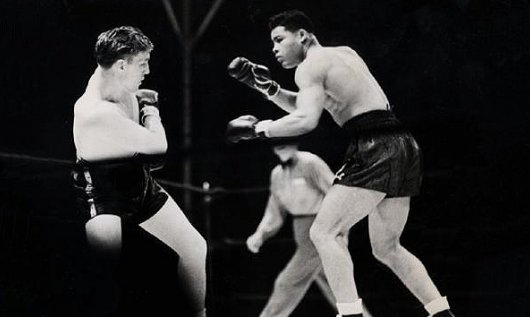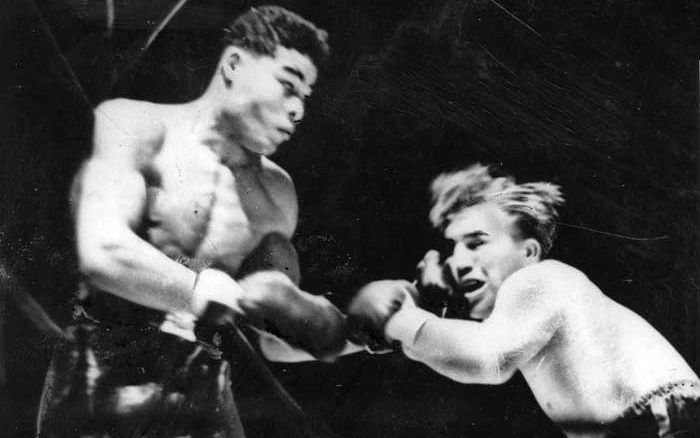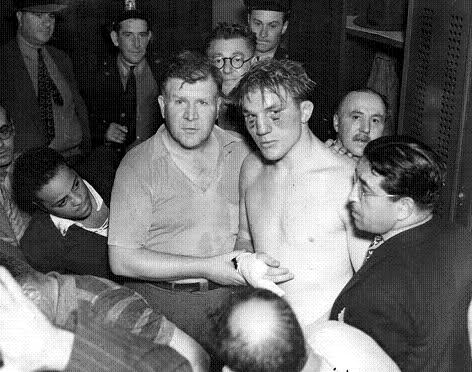The great Joe Louis, already something of a legend, made his first defense as heavyweight champion against Welshman Tommy Farr just nine weeks after his title-winning knockout over James J. Braddock. Few thought Farr capable of troubling Louis, let alone winning, but the challenger’s obdurate fighting style, coupled with Louis’s lethargy, provided for a long and interesting fight in which both men would be hurt and a controversial decision rendered. The announcement that Louis had retained his title was met not by a Bronx cheer but unabashed booing, as many felt the brave Welshman had been robbed.
Farr, son of a bare-knuckled battler, began his professional boxing career at the remarkable age of thirteen and by the time he met Louis he had already fought over one hundred bouts. By contrast, Louis had only 33 pro fights, managing in that space to smash his way through the rankings and become champion. His only defeat, a huge upset, was to Germany’s Max Schmeling a year earlier at Yankee Stadium, a stain that—to his great vexation—he still hadn’t received an opportunity to avenge. Louis had prodigious power and eight of his last nine victories had come via stoppage. Most believed that as soon as Louis’ fists made contact with Farr’s chin the Welshman would be retired, leaving Louis to pursue the more important enterprise of a return bout with Schmeling and the reclaiming of his, and America’s, sense of pugilistic superiority.

True warriors like Farr, however, have too much spirit to ever be so casually dismissed, since their identities are indistinguishable from, and mostly predicated on, how they perform in combat. From the opening bell Farr attacked with verve, reaching the champ with hard body shots. He continued the pace in the second, landing some dangerous hooks, and then began coming over the top with the right hand. However, the action was not one-sided, as by this point one of the champion’s blows had opened a nasty gash on Farr’s face which his corner scrambled to deal with.
Fighting irrepressibly, Farr continued attacking, weathering a tough fifth round and winning the sixth. In the seventh, Louis hammered Farr with a series of uppercuts but the challenger remained undaunted and bipedal. In perhaps his best moment, the Welshman hit Louis with a beautiful left hand in the eighth, sending the crowd into a surprised frenzy. For the first time in the fight, Louis appeared vulnerable but the champion reclaimed the bout in the tenth and eleventh rounds when his brilliant jab asserted itself. Farr’s activity decreased over the fight’s final rounds, but each time it looked as if his mounting fatigue might lead to a stoppage, the challenger, his eyes ever more veiled by his own blood, responded with a vigorous attack.

Farr fought valiantly in the final round as he sensed only a knockout could unseat the champion. Too intelligent to be drawn into a potentially disastrous brawl, Joe’s counter-punching ensured he emerged from the round unscathed and from the contest with his world title intact. In addition to the crowd’s displeasure with the decision, there was some confusion when the verdict was announced as the referee mistakenly raised the challenger’s hand.

Farr though was gentlemanly in defeat and neither protested nor looked particularly aggrieved. While he lost the fight, he gained widespread acclaim. He had given a splendid account of himself while giving “The Brown Bomber” one of his toughest fights. As Louis went on to become the most dominant champion in heavyweight history, this stands as a major accomplishment all by itself.
— Eliott McCormick






















